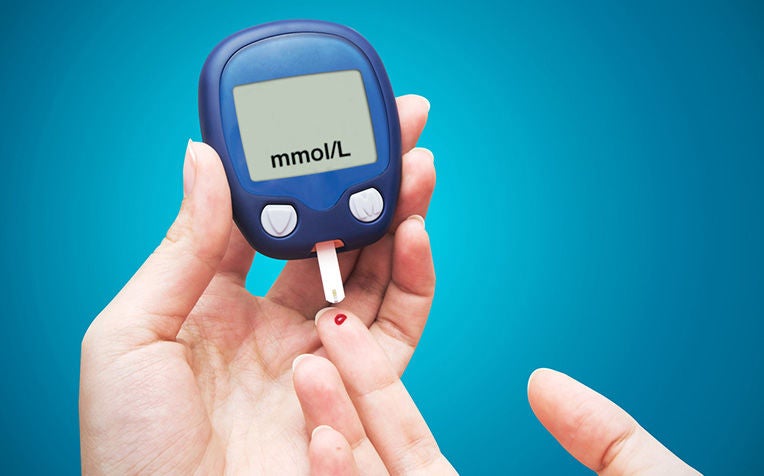
Managing blood sugar levels when you fall sick follows three basic rules: check your capillary blood glucose levels frequently, remain well hydrated with sugar-free fluids, and continue taking your diabetes medications*.
Information provided by Dr Daphne Gardner, Senior Consultant from the Department of Endocrinology at Singapore General Hospital (SGH), a member of the SingHealth group.
When you are ill, your body becomes more resistant to the insulin you produce or take by injection. This means that your blood glucose (BG) level will tend to rise. If you feel nauseated, your fluid intake may decrease. Dehydration can result in the blood glucose (BG) level rising further.
On the other hand, you can also lose your appetite or feel nauseated. In eating less, the BG level may trend lower.
The three rules of sick day management are therefore to:
- Check your capillary BG levels more frequently (e.g. 4 times a day)
- Sip sugar-free fluids
- Do not stop taking your diabetes medications*; in particular if you are on insulin, you should not stop taking insulin
* Some exceptions (see below in section on medications)
Capillary blood glucose (BG) levels
In general you should aim for BG levels of 4-8 mmol/L pre-meals.
When you are ill, the illness itself can cause your BG levels to rise.
However, if you are also feeling nauseated and your appetite is poor, your BG levels can also fall.
Testing your BG levels frequently (4-6 times/day) can help you decide what action to take.
Try to maintain a normal meal pattern where possible.
If your BG level is falling but still in range (4-5mmol/L), and you have little appetite to eat, try to consume some food that contains carbohydrates and is easier to digest e.g. rice porridge, soup.
If your BG level falls to less than 4 mmol/L, that indicates hypoglycaemia (low blood glucose). In this scenario, consume 15g of quick acting carbohydrates (eg: 150ml fruit juice or soft drink, or 3 teaspoons of sugar in a glass of water) to treat hypoglycaemia and re-test 15 minutes later to ensure BG level is now more than 4 mmol/L.
Related article: Hypoglycaemia (Low Blood Glucose): What To Do
Fluids
If your blood glucose (BG) levels are high (>8 mmol/L), sip sugar-free fluids to ensure you remain well hydrated.
If your BG levels are low-normal (4-5 mmol/L), and your appetite is poor, consider consuming fluids that contain sugar (e.g. fruit juice).
Medications
1. Insulin
In general, DO NOT STOP your insulin injections. If you have Type 1 diabetes, there are more steps you need to take to keep yourself safe. Please refer to Facebook SgDAFNE
Sometimes, with the higher blood glucose (BG) levels associated with sickness, you may need a higher dose of insulin until you recover from your sickness. In general, if your BG levels are still >10 mmol/L 24 hours after falling sick, your background insulin dose may need increasing. If you are on more than one insulin injection a day [E.g. twice daily premixed or 4 times daily insulin (once daily background and 3 quick acting insulin doses for three meals)], the doses of these insulins may need increasing. Contact your healthcare team if you are uncertain what to do.
Remember to decrease the insulin dose back to your usual dose when you recover.
2. Sulphonylurea tablets
Examples of this group of tablets available in Singapore include: Gliclazide, Glipizide, Glibenclamide, Tolbutamide and Glimepiride.
These tablets work by increasing the body’s production of insulin regardless of the blood glucose (BG) level. So if you take this tablet, you MUST NOT skip your meals/not eat.
If your appetite is poor and you have taken your usual dose of Sulphonylurea, consider consuming carbohydrates that are easier to eat: a fruit/rice porridge/fruit juice.
Your tablet dose may even need to be halved/omitted during this period of time. If in doubt, seek advice from your healthcare team.
3. SGLT2 inhibitors
Examples of this group of tablets available in Singapore include: Empagliflozin, Dapagliflozin, Canagliflozin.
These tablets work by increasing the amount of glucose passed in urine. This then results in more water loss through the urine which can increase the risk of dehydration. In addition, these tablets may also increase the risk of acid (ketones) forming in the blood, particularly on sick days.
Stay well hydrated through this time. If your appetite is reduced, consider replacing meals with carbohydrate snacks/drinks.
Your tablet may need to be stopped if you are unable to eat or drink. Please seek advice from your healthcare team.
When to seek medical attention
Seek medical help if you are:
- Vomiting
- Drowsy
- Unable to keep fluids down
- Having persistent diarrhoea
- Seeing blood glucose levels that are persistently ≥15 mmol/L
These tips are general guidelines only. Please talk to your healthcare team or Diabetes Nurse Educator for more specific instructions.
Ref: L20
Other diabetes articles you may be interested in:
Diabetes Foot Care Tips: 10 Steps to Healthy Feet
Tips for Travelling with Diabetes
Because #healthiswealth #healthforgood
Contributed by


















 Get it on Google Play
Get it on Google Play